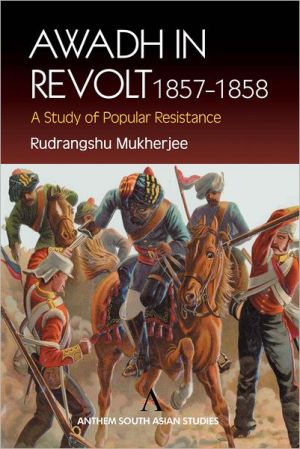

 |

|

The average rating for Awadh in Revolt, 1857-1858 (South Asian Studies Series): A Study of Popular Resistance based on 2 reviews is 2 stars.
Review # 1 was written on 2018-09-03 00:00:00 Jean Gerardot Jean GerardotTejani's monograph is a historical analysis of the changing meaning of secularism in Indian context. Her key arguments are twofold - first, that understanding the rise of secularism in India requires one to move beyond religion to a consideration of caste; second, that secularism assumed very particular historical meanings in Indian setting due to its emergence at the nexus of community and caste, liberalism and democracy and nationalism and communalism. To reconstruct a history of secularism in India, Tejani focuses on six historical moments during 1890-1950 as milestones that crystallized political concepts including community, patriotism, communal, communalism, democratic majority and secular citizenship. These moments are discussed under three sub-themes: Nationalism, Communalism and Secularism. The section on Nationalism first discusses the emergence of a Hindu community in Maharashtra (1893-94) through conflicts over Hindu procession music and cultural innovations leading to articulation of broad-based, regional ideas of patriotism. These ideas became national through the Swadeshi movement (1905-1910). Popular challenges to emerging definitions of nationalism and patriotism were branded anti-nationalist. In the section on Communalism, Tejani first explores the shift of Indian Muslims from a 'religious community' to the 'communal minority', over the course of Constitutional debates (1906-09) and how the majority-minority divide widened with the break down of Khilafat and non-cooperation movements. The section on Secularism first examines the journey of depressed-classes from untouchable to Hindu. The final chapter traces the journey from nationalism to secularism through the Constitutional debates of 1946-50. While nationalism defined Muslims as minorities, secularism was invoked as an argument against the protection of minorities on the grounds that it would re-ignite the processes that once led to partition. She concludes that this fraught relationship between inequality and identity lies at the heart of secularism and democracy in India and that a truly democratic and plural society can emerge only when historical meanings of secularism are understood and its destructive ideological formulations are discarded. |
Review # 2 was written on 2013-04-11 00:00:00 Tim Harpster Tim HarpsterTejani has reconstructed historical events that define the boundary conditions of 'Indian Secularism' at the time when the constitutional framework was in the process to be established'an event when it was to be decided that who will be called 'citizens' and who will be benefitted from the reservation and why, under a liberal, democratic and secular nation'India. This book addresses the preconditions of the 'unique definition of secularism' that emerged in the Indian setting broadly at the nexus of nationalism and communalism, & caste and community. Tejani through her detailed research argues that secularism at the time of constitutional building was invoked to suppress the challenges being posed by Muslims and untouchables. What were those challenges and how such challenges evolved throughout time have been shown by analysing six historical moments during 1890-1950. During this period, the political language of the community, patriotism, nationalism, communal, communalism, majority, minority and secular citizenship was condensed. Although the book is well researched and addressed the problem in its entirety, I feel some excessive and detailed information could be omitted that was not adding much to the arguments. Overall, it was a good read. If you are interested in why India has failed as a 'secular' nation, you should read this academically driven monograph by Tejani. |
CAN'T FIND WHAT YOU'RE LOOKING FOR? CLICK HERE!!!